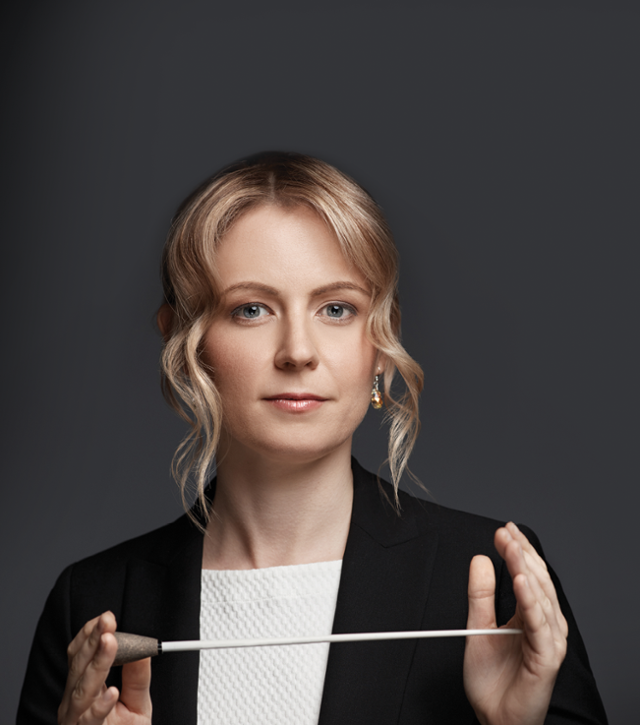Summer 2022
Gemma New

New Zealand–born Gemma New is celebrated around the world for her intelligent interpretations and expressive conducting. The recipient of the 2021 Sir George Solti Conducting Award, she is the music director of Ontario’s Hamilton Philharmonic Orchestra and the principal guest conductor of the Dallas Symphony Orchestra. This season will take her from Montréal and Minnesota to the Netherlands, Britain, and France — and to Festival Napa Valley.
We are looking forward to L’elisir d’amore, which you are conducting at Festival Napa Valley. Is conducting opera different from conducting symphonic music?
Thank you! I am looking forward to working with everyone on this performance. When working with singers and orchestra for a symphonic concert, the singers are often
very close to the conductor, or at least with a very clear line of sight. In opera, the singers can be quite far away on the large stage. They could be following monitors, or staging
direction, so the communication between singer and conductor is quite a different dynamic.
You’ve conducted everything from Handel’s Messiah to Joby Talbot’s Ink Dark Moon. Do you approach classical and new music differently?
I study the inspiration, culture, history, and style behind each piece, and analyze the structure, character, orchestration, and all the wonderful details that are intrinsic to its language. So conducting starts to become a natural and familiar journey.
You’ve led orchestras all over the world. Is conducting a universal language, or do you find you have to adapt your style or physicality to different regions?
Every orchestra has its own set of traditions and most natural way of working. However, we all have a common goal — the performance — and through a conversation, with and without words, we find the best ways to interpret and communicate the music. It’s important to me to be actively preparing or responding gesturally, and it’s important that when I do use words, they are clear and direct so that the pacing of the rehearsals keeps everyone focused and motivated.
When did you first become involved with the arts, and how did it influence your path in life?
I started playing the violin at a young age. This got me passionate about music. My high school had five orchestras and ensembles, so I got my first opportunity to conduct when I was 15. I was so excited to see how everyone’s parts worked together, and what the journey of the piece was like, and how to unite our ensemble from the first rehearsal to the concert. I knew right away that I wanted to pursue a career as a conductor.
How can we get more young people interested in conducting?
Throughout my career, I have been inspired and encouraged by mentors who generously
took the time to share their experiences with me. I hope that the younger generation feels like they can explore and ask questions freely, and that their passion is met by relatable and supportive mentors.
What is the biggest misperception people have about conductors?
A lot of people see the “waving hands” on stage and think that is the job. That is probably 10 percent of the job! Most of a conductor’s time is spent on preparation behind the scenes.

Favorite food: Apple pie. Upon moving to the US in 2009 it became my favorite dish.
Favorite wine: I’ll be the first to admit that I really appreciate wine, but I don’t know much about it. I absolutely love Napa wines, and New Zealand wines too.
Favorite place you’ve traveled: I will pick Paris because I am currently in this joyous city, enjoying the beautiful springtime and soaking up the history and culture. The French have created so much beauty, structure, and detail that we benefit from, not only in music but also in architecture, food, and wine.
Dream destination: Ever since I conducted Chris Theofanidis’ The Legend of the Northern Lights, I’ve wanted to experience the Northern Lights.
Wish for the future: I dearly wish that we could incorporate more music education in public schools. It would be so beneficial for our younger generations as they learn how to become both leaders and team players, how to express their creativity and emotions, how to build their knowledge incrementally through patience and hard work, and how to listen to each other.